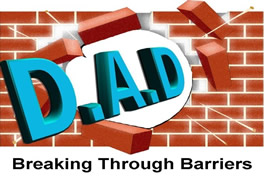
Disability Equality Training (DET)
DAD delivers current and relevant Disability Equality Training.
Your training can be specifically tailored to your needs and may include individual modules selected from the following topics:
- The difference between ‘disability’ and ‘impairment’
- Stereotyping
- Hate Crime
- Models of disability
- Equality act and protected characteristics
- Access
- Etiquette
- Behaviour and Language
- Best practise
- Independent Living
We have provided training for many years to different people including Disabled people, Crown Prosecution Service, Darlington Borough Council, Darlington College of Technology, Durham University, NHS, and local and regional businesses.
Feedback from the Crown Prosecution Service - September 2017:
“DAD was commissioned to provide training to CPS staff on the Social Model of Disability partly to improve the service offered to disabled victims and witnesses, and partly to enhance understanding of issues and barriers for disabled colleagues. Feedback from staff was very positive. The trainer had listened carefully to what we wanted to achieve, and the training clearly achieved our objectives, and the objectives of individual participants. Participants described the session as not only thought-provoking and useful, but also enjoyable.”
Cost
Disability Equality Training is usually a full day course. Prices are based upon your specific needs, so contact us for a quote. Concessionary rates may be available for block bookings or voluntary organisations.
We also have accessible premises in Darlington in which we can deliver the training to you, at a slightly additional cost, please ask for details.
For further information, please contact:
David Thomas
01325 254840 or Email David
Autism and Labelling
Alisha, one of DAD's Young Leaders, wrote this blog as part of her work with FLARE. In the blog Alisha describes her experiences and highlights some important messages that we should all consider when working with children and young people.
I am young person with autism, my autism is a part of me but it does not define me. I know what it is like to have labels put on me.
Like
“the naughty child”
“attention seeker”
“the disruptive one”
People label us because they do not know how to react or what to say. It is not right it makes people feel upset and ashamed to have them labels put on them.
But that is not the case. If people took a little bit of time to get to know me, they would realise that when I get the support I need and when people treat me with dignity, I am really a caring person. I would learn much quicker if people just took a little while to realise that I want to try hard and be successful in life, but I need some help to accomplish the goals that I set myself.
Not having the right support throughout education can give children and young people the labels of ‘the attention seeker’ or ‘the naughty child’ because they will not be able to excel in learning and get bored so they will try and get the attention of the teacher for the teacher to help them to understand what they need to do.
Some children and young people need to play fidget toys like (fidget spinners or fidget cubes) in order to be able to concentrate for long periods of time. Also some children and young people need to be able to walk around because they can’t sit still for a long time, this can cause disruption in the classroom and seen as the person just walking out of the situation when they are really self regulating.
I feel that having the recourses around me like fidget spinners, fidget cubes, blue tak and paper and coloured pencils can keep me focussed on the task that I need to do because if I am doing something with my hands I can concentrate better
Don’t put the labels like “the naughty child”, “the disruptive one” or “attention seeker” on all children with autism or any other disability or impairment because we are not all the same we are all unique and our own person.
Everyone is their own individual person so they should be treated as an individual. Life is about doing your best and if one person can accomplish more than another then don’t try and put them down because of that. Try to help us to succeed in what we are doing by encouraging us to try our best and telling what we are doing well and not always what we are doing wrong or need improving.
Instead of labelling children and young people with autism try to understand that they have their own individual needs
Just because a child or a young person does not have the diagnosis of autism or ADHD does not mean that they don’t have autism or ADHD it may just mean that they are good at hiding their issues and it has not been recognised.
I think that adults need to be trained in disability awareness and not just physical disabilities but hidden disabilities like autism, ADHD and dyslexia so that they can understand children and young people
I think that schools and other environments should be more autism friendly because it will allow people with autism to access more environments in the community without getting stressed or anxious which could lead to challenging behaviours which could be hard to manage in a community space
How you can support us
As a local organisation we very much rely on the support of our local community. We support over 2,000 people every year to have greater choice and control and remove the barriers that disabled adults and children experience in their everyday lives. But we need YOUR help.